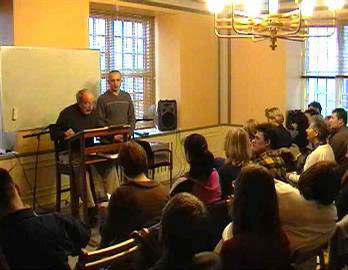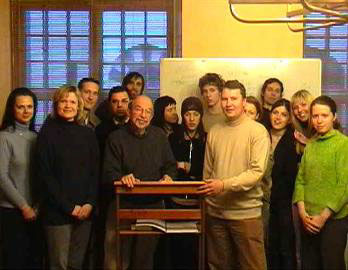|
Report on Baltic Reformed Theological Seminaryby Larry Sibley
I begin again to think back over the last two weeks spent with 22 students in Riga, Latvia, at the Baltic Reformed Theological Seminary. A few pastors and elders, along with many worship leaders, gathered in a classroom at the Reformers Church building in Old Riga. We began each evening with prayers: praying a Psalm or two, hearing passages from Matthew, and petitioning God for the needs of the church and the world and thanking God for the blessings of the day. We were following an ancient pattern of prayer that is reflected in Acts 4:23-31. We also explored the biblical background for this pattern of daily prayer and followed it into the early church as described in our textbook, Worship: Reformed According to Scripture (Hughes Oliphant Old, Westminster John Knox, 2002). Most of our class time was spent on the full Sunday morning service of word and sacrament. Starting biblically with the assembly in the Sinai desert (Acts 7:38; Exodus 19-24) and historically in 16th century Geneva, we spent much of the first week on the major biblical passages that set the pattern for Sunday worship and on the history of what the church has done to practice this. We spent a few evenings on culture and worship so that worship in Riga might be Latvian, not merely an import from the West. And we looked at several working models from other urban churches, not so they could be copied, but rather to understand various ways of implementing biblical and historic patterns. The students were ready to look at the worship practice of their churches in Riga, especially the three Reformed Churches that have been planted in the last fifteen years, and evaluate this by the scriptural norms. Much has been renewed and reformed in the last few years, but they were able to see more to do. We talked about what could be done to enrich the diet of prayer in their services, both in music and in the various prayers. The final prayer of thanksgiving (patterned on the practice in Geneva) that we used in the opening prayers each night is a good candidate for regular use. Indeed, when I preached at the Riga Reformed Church, which meets in a salle at the Technical University, such a prayer was used for the first time.
To develop leadership for the Reformed churches of Latvia, Lithuania, and Estonia, Riga (newly renamed Baltic) Reformed Theological Seminary (http://www.rrts.edu.lv) was begun six years ago. Guest professors, largely from United States seminaries and pastorates, have covered a comprehensive curriculum of biblical studies, systematic and historical theology, and pastoral theology. The school has a regional vision: equipping pastors and other leaders for the Baltic and Scandinavian churches. As part of their larger program, they will begin to offer an accredited master's degree through Latvia University in the fall. This is a strategic ministry and I appreciate so much your partnership, making these two weeks possible. The seminary class sent me off on the last evening with a couple of gifts, plus greetings to you and appreciation for your supporting prayers. |







 May 22, 2004. 35,000 feet above Labrador and watching the progress of my flight on the little monitor attached to the back of the seat in front of me. Home is not far away.
May 22, 2004. 35,000 feet above Labrador and watching the progress of my flight on the little monitor attached to the back of the seat in front of me. Home is not far away.  So, John Calvin was not the last to seek to bring weekly worship more into line with Scripture and the uses of the early church. His heirs in Riga are following in the same path, enriching and reforming the worship patterns they inherited from American missionaries in the 1990s and looking to Calvin's example for wisdom. In order to broaden this renewal, we held a conference on May 15, to which 50 members from the three Reformed church came, with their music groups. We had a wonderful day together worshiping and studying.
So, John Calvin was not the last to seek to bring weekly worship more into line with Scripture and the uses of the early church. His heirs in Riga are following in the same path, enriching and reforming the worship patterns they inherited from American missionaries in the 1990s and looking to Calvin's example for wisdom. In order to broaden this renewal, we held a conference on May 15, to which 50 members from the three Reformed church came, with their music groups. We had a wonderful day together worshiping and studying.